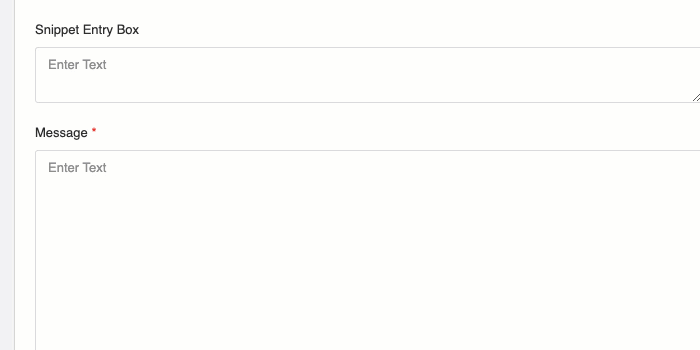
Better Conversations for
Better Feedback on Teaching
Better Conversations for
Better Feedback on Teaching

The Professional Writing App for Instructional Leaders
Latest Updates
Documentation
Communication
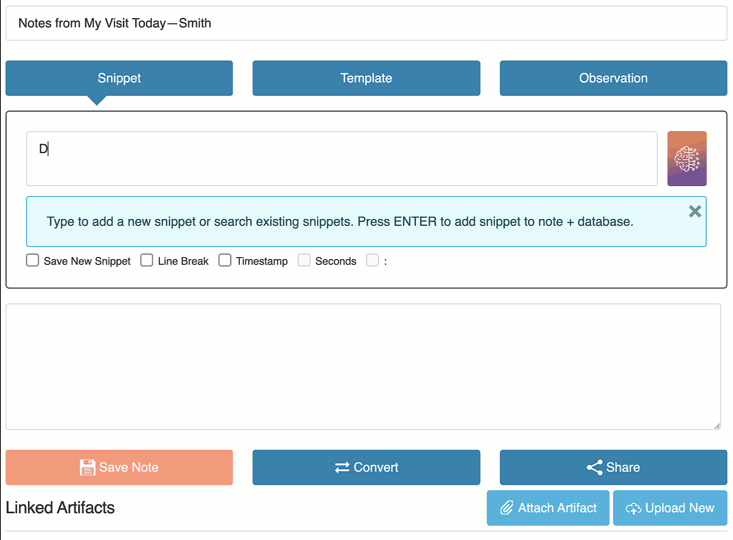
Repertoire is a web-based walkthrough app from Dr. Justin Baeder, creator of The Instructional Leadership Challenge and author of Now We’re Talking! 21 Days to High-Performance Instructional Leadership.
Based on the leadership principles in The Instructional Leadership Challenge, Repertoire helps you take notes and send written feedback to teachers in dramatically less time—while helping you build your repertoire of helpful feedback phrases.
Repertoire is available exclusively to members of the Instructional Leadership Association, our main program at The Principal Center.
Better Observations with Repertoire
Next Up: Get To Every Teacher

Repertoire's "Next Up" button automatically finds the teacher you need to observe next, so you never miss anyone.
Simply enter your staff roster and the app will pick teachers at random for your first cycle of observations. Then, once you've visited everyone once, Repertoire will select the teacher you haven't observed in the longest time.
That way, you won't miss anyone, and you won't avoid anyone.
And if someone is absent or isn't teaching at the moment, you can hit "Next Up" again to jump to the next teacher—and the teacher you skipped will be selected next time you hit the button.
Snippets: Better Writing with Less Typing
Snippets are saved chunks of text—of any length—that you might use again. They can be:
When you type something in the Snippet box and hit enter, Repertoire remembers it and suggests it next time you start typing the same thing. There are no extra steps, no settings to configure—and you don't even have to decide to save a snippet. It happens for you, effortlessly, as you write.
How Snippets Work, And How They Help
Repertoire's Snippet feature increases your capacity for instructional leadership in three ways:
You can keep just about any kind of text in Repertoire Snippets:
You can copy and paste whatever text you'd like into the Snippet box, or you can upload a spreadsheet to bulk-import an entire library of words, phrases, standards, criteria, or anything else.
For example, if you type "1c3" you can pull up the Danielson Framework's Domain 1, Component C, Level 3 descriptor so you know what "proficient" practice for "setting instructional outcomes" looks like.
Or if you type "clauses" you can pull up "L.7.1c. Place phrases and clauses within a sentence, recognizing and correcting misplaced and dangling modifiers." if you've added the Common Core State Standards Language Progressive Skills to your library.
It's entirely up to you. There's no clutter, because your Snippet library only contains snippets that you've actually typed, or that you've imported to enhance your repertoire.
And if you want to delete a Snippet, just click the red X when it appears in your search results.
Templates: Providing Consistent Communication
Repertoire's Templates feature allows you to create a re-usable template for any situation:
Message structure—If you want to use a similar salutation and signature for each message you send, you can save it as a template, and add unique content to the middle.
Thinking structures—If you want to structure your thinking with sentence-starters such as "Students were..." and "I noticed..." you can include them in a template.
Activity-specific templates—If you enter a classroom and group work is in progress, you can give yourself sentence-starters to provide high-quality feedback on the teacher's approach to facilitation. Or, if direct instruction is taking place, you can pull up your template for feedback on direct instruction—whatever the situation demands.
Strategy-specific feedback—If you're focusing your feedback on a particular instructional strategy or initiative, you can use the same structure for your feedback to each teacher.
Non-observation emails—If you want to provide feedback on each teacher's weekly lesson plans, you can create a message template and re-use it for each teacher—with the teacher's name, date, and other information pre-filled with easy-to-add variables.
Repertoire supports a number of template variables to save you even more time: First Name, Last Name, Email Address, Date (several formats), Day of week, and Time of Day (Morning/Afternoon).
Scripting: Better Documentation for Better Conversation
If you like to "script" a running record of what you're seeing and hearing in the classroom, Repertoire makes it fast and easy:
A New Approach to Professional Writing with Repertoire
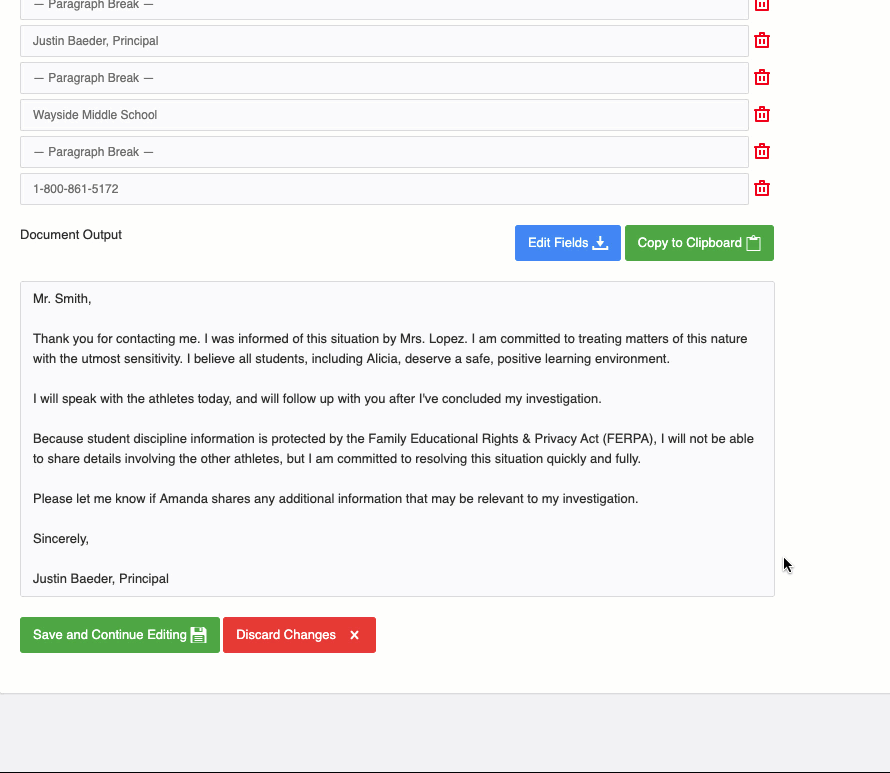
Use Repertoire Content Creator's drag-and-drop templates for high-stakes professional writing
School leadership is a people-centric job, and much of our work happens face-to-face. But every school leader carries an invisible burden: the behind-the-scenes work of professional writing that's so essential for effective documentation and communication.
When we write well, it strengthens and accelerates our interpersonal efforts to lead improvement. But when we're pressed for time—as leaders almost always are—writing becomes difficult, and we may not even have a chance to write at all. As a result, critical communication and documentation may simply fail to happen.
Fortunately, the cyclical nature of our work makes it possible to build on our previous writing in each new situation—if we have the right tools in place. Your approach to similar situations is probably very consistent, even if the circumstances differ.
So your writing can be largely the same each time—however, each situation calls for a slightly different:
- Tone
- Facts
- Proper nouns
- Pronouns, and
- Messaging at key points
Repertoire's Documents tool makes great professional writing fast and easy, thanks to three key features:
Documents Designed for Stress-Free Reuse
Together, these three features solve two biggest challenges with re-using your writing—what we call mismatch and FARA.
Mismatch occurs when a new situation doesn't quite match a previous situation, so it won't quite work to re-use your writing.
For example, if you're writing a letter to notify parents of a teacher's departure, the tone of the letter should match the circumstances.
That's why it's so helpful to have multiple options in the Phrase editor, so you can strike just the right tone while communicating the same essential information.
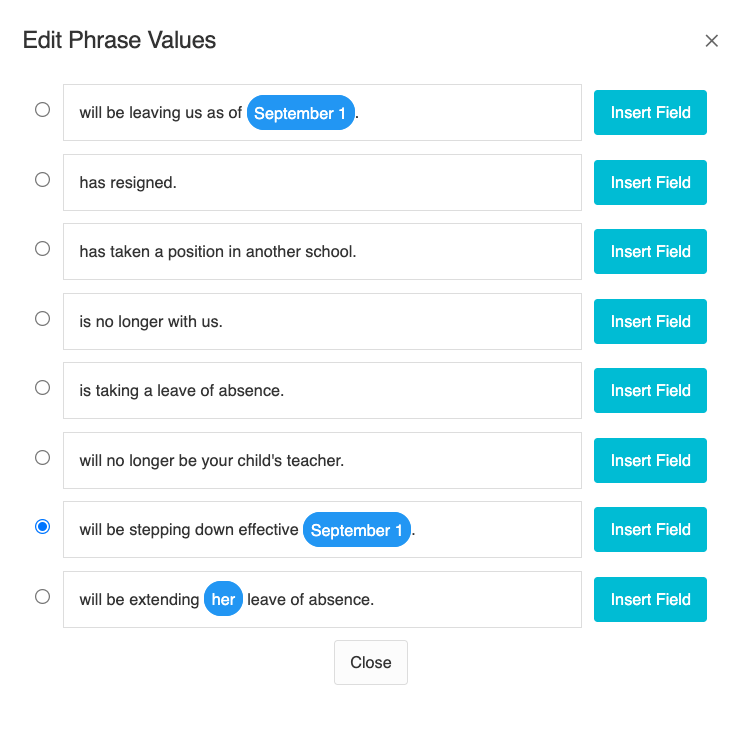
The second problem, FARA, short for "Find-And-Replace Anxiety," comes from our awareness that re-using our writing can introduce typos and grammatical problems, like noun/pronoun or subject/verb disagreement.
For example, a letter about a female teacher may have a dozen or more words that need to be updated before the letter can be re-used for a male teacher:
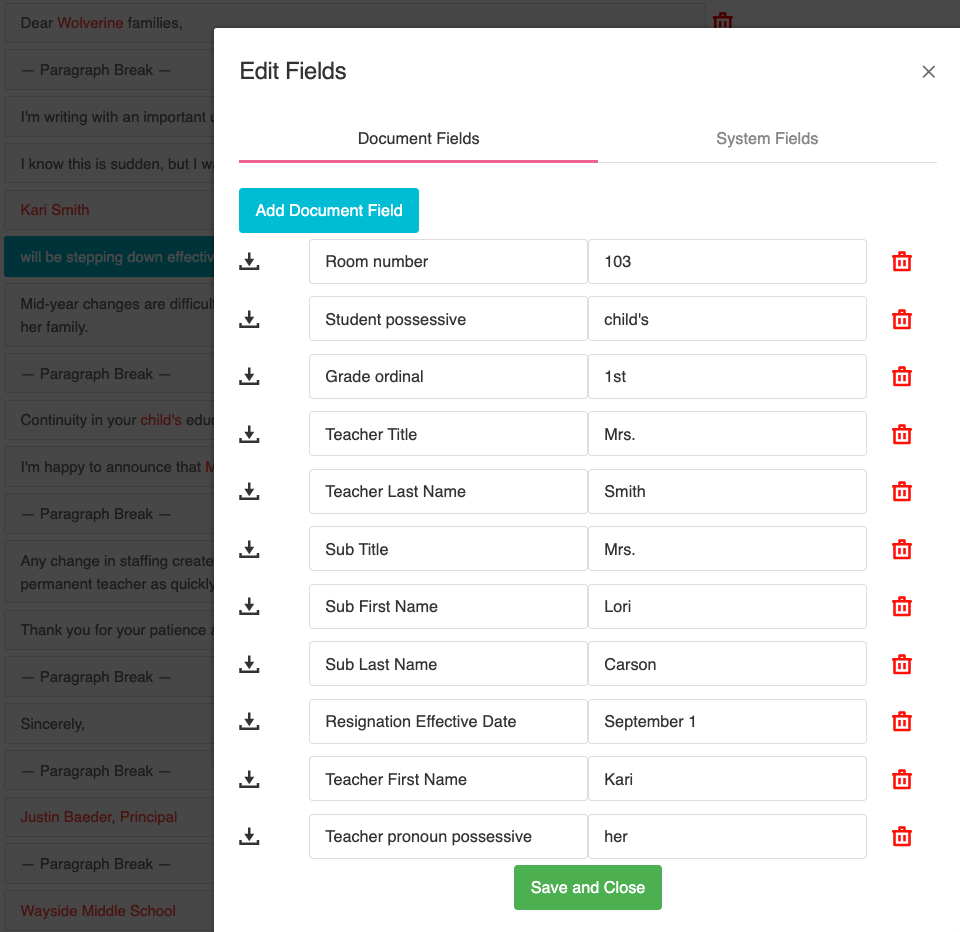
In high-stakes professional writing, there's no room for embarrassing mistakes—but that doesn't mean you can't re-use your writing. With Repertoire's Fields feature, you can quickly update all of the key nouns, pronouns, adjectives, and other details, so they're perfect every time.
All of Repertoire's built-in templates are designed to solve the mismatch and FARA problems, so you'll see how easy it is to craft your own templates with re-usability in mind.
Our Growing Template Library
Repertoire Content Creator features built-in templates that you can customize in seconds, including:
- Job search cover letter
- Employee letter of concern re: performance issues
- Disciplinary incident notice to parents
- Email response to parent concern
- Announcement of a newly hired teacher
...and many more, with new templates added all the time.

Justin Baeder, PhD.
Director, The Principal Center
I believe that instructional leadership is one of the most rewarding and challenging roles in the world. We have the opportunity to impact students' lives forever—but so much can get in the way.
There's too much information to manage, too many staff to supervise, and too many ideas to keep in your head.
We've created Repertoire to expand your capacity to use the "language of learning" in all of your written communication and documentation as an instructional leader. I hope you like it!
Sincerely,

—Justin Baeder, PhD
